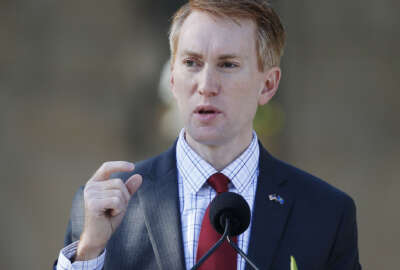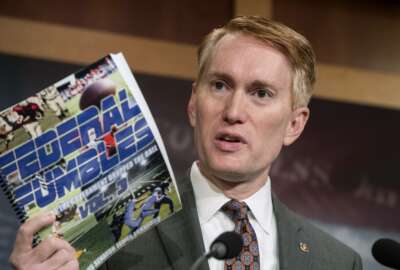 Exclusive
Exclusive Lankford: There shouldn’t be one federal wastebook. ‘There should be 535’
Sen. James Lankford (R-Okla.) has cataloged some of the federal government's spending on usual or duplicative programs through the annual release of "Federal...
For three years, Sen. James Lankford (R-Okla.) has cataloged some of the federal government’s spending on unusual or duplicative programs through the annual release of “Federal Fumbles,” the spiritual successor to former Sen. Tom Coburn’s (R-Okla.) Wastebook series.
Since then, several lawmakers, including Sens. John McCain (R-Ariz.), Rand Paul (R-Ky.) and Jeff Flake (R-Ariz.) have kept the wastebook legacy going with their own watchdog reports.
If those sound like duplicative programs, Lankford would disagree. In fact, Lankford said Wednesday that he’d like to see more congressional offices publishing their own wastebooks.
Many more, actually.
“There shouldn’t be one Federal Fumble book. There should be 535. Every office in the House should put it out, every office in the Senate. We all see the different issues that are out there,” Lankford said Wednesday during a forum with Coburn, who announced the launch of a new website aimed at tracking wasteful federal spending, and the Foundation to Restore Accountability.
Lankford also pushed for passage of his Taxpayers Right to Know Act, which would require the Office of Management and Budget to publish a list of federal programs on its website that receive more than $1 million in annual appropriations.
“It’s one of those plain-sense bills that any office could do,” Lankford said. “Should we have a list of all federal programs, so that any American, any watchdog group, any congressional office can ask the question, ‘Do we do this in multiple places, whatever the this is?'”
The bill passed the House in January 2017, but has yet to receive a vote in the Senate. Lankford said he’s been in discussions with senators to tweak the legislation, and to also look at ways the bill could fill some of the “missing elements” that Lankford sees in the DATA Act, a transparency law that requires agencies to submit standardized spending reports.
Lankford said his bill is part of a broader vision of more oversight not just from congressional offices, but from the leadership of federal agencies. He said many agency heads complain to him about redundant programs that are the results of new laws or executive orders.
“When I privately talk with heads of agencies and those deputy secretary assistants of [agencies], they almost always tell me, ‘We started this program because we were given a presidential mandate to go after this issue. So we started several years ago. Now it’s four years later and we found out we’re doing it and so are 10 other agencies,” Lankford said.
In his conversations with agency leaders, Lankford has learned that, for example, there are more than 50 job-training programs across government.
“It’s not just about spending, it’s about also things the federal government should do that they’re not doing well, or that they have no business doing,” he said.
Coburn said more programs on an issue does not equal more efficiency. If anything, he said it’s the opposite. He cited 26 teacher training programs in the federal government — 22 of which are outside the Education Department.
“Why not just have one and make it official? Each one of those programs has a bureaucracy, with a head, assistant head, then all the employees. And then when you go look at the outcome of the teacher training program from the federal government, it’s not very good,” Coburn said.
While the Government Accountability Office often sheds some light on federal fraud, waste and abuse, Lankford argues that the federal watchdog doesn’t get the whole picture.
“If you were to ask, ‘How many programs do we do for … ?’ and then fill in the blanks, you know how you get that answer? Go to GAO, make a request, 18 months from now, they’ll come back with an answer,” he said. “We’ve got to be able to get an answer to those basic questions.”
For his part, Coburn, who says he used to carry a list of redundant agencies in his pocket while serving as a senator, added that fighting federal waste is a bipartisan team effort that requires a lot of homework.
“You have to believe that oversight can make a difference, and I’m not sure most members of Congress believe that,” Coburn said.
Coburn on Wednesday also announced the launch of Pursuit, a website aimed at promoting federal fiscal oversight to millennial-age Americans.
The tradition of Congress tracking federal waste goes back to former Sen. William Proxmire (D-Wis.), whose “Golden Fleece” awards in the 1970s and 1980s took jabs at government programs, such as a Justice Department study on why prison inmates wanted to get out of jail.
Copyright © 2025 Federal News Network. All rights reserved. This website is not intended for users located within the European Economic Area.
Jory Heckman is a reporter at Federal News Network covering U.S. Postal Service, IRS, big data and technology issues.
Follow @jheckmanWFED
Related Stories





